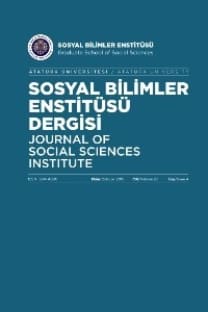The legacy of communist idealism contested in chicken soup with barley by Arnold Wesker: Political upon the personal and subverted binary opposites
Dramatik bir çalışma Arnold Wesker'in ilk oyunlarının, İşçi Partisi'hin beklenen fakat şaşırtıcı başarısıyla gelen yeni dünya düzeni ve Yeni Sol hareketinin en hafif ve yumuşak tanıklığını gösterecektir. Savaş sonrası dönemin ilk yıllarında Britanyalılar anakroniktik bir şekilde uzun Edward yazları hayalini kurmuş ve bu yanılgıyla yeniden barışa kavuşmuştur. Buna rağmen, ne yazık ki bastırılan savaş hatıraları bir hayalet gibi dönemin yazınında ve atmosferinde etkisini gösterir. Bu yüzdendir ki Wesker 'in özellikle ilk oyunlarında savaş, yeni neslin hem ülkücülüğünü hem de hayal kırıklığını anımsatır bir şekilde iki boyutuyla var olmuştur. Bu bilgiler ışığında çalışmamız Arnold Wesker 'in Chicken Soup with Barley (Şehriyeli Tavuk Çorbası) oyununda komünist ülkücülük ve hayal kırıklığı konularını genişletmeye çalışıyor. Bu oyunda, savaş sonrası Britanya tiyatrosunun tipik oyun yazarlarından her anlamda kızgın bir genç olan Arnold Wesker acı bir şekilde politik olanın bireysel ve kişisel olan üzerinde nasıl şekillendirici bir etkisi olduğunu gösterir. Ayrıca değiştirdiği ve karşısında mücadele verdiği şey aynı zamanda cinsiyet politikasıdır da. Bu iki sorun daha sonra onun etnisite (în-giliz-Yahudiliği), sınıf (emekçiler) ve cinsiyet (ikili zıtlıklar) konularını ele alışını da etkiler.
Arnold Wesker'in chicken soup with barley (Arpalı tavuk çorbası) oyununda Komünist idealizm mirası: Birey üzerindeki siyasi zorunluluk ve bozulan ikili karşıtlıklar
A dramatic dismantling will surely show that Arnold Wesker's early plays represent the most amiable contestation of the New Left and the new conditions with the surprising yet desired success of the Labour. In early post-war years, Britons anachronistically hold the myth bf the long Edwardian summer and thus reconnect with peace after the Great Wars. Unfortunately, though, the repressed memories of War s haunt the writings and the aura of the age. That's why in Wesker's accounts, especially in his early corpus, Wars work double shift reminding us the hopes of the new generation and their disillusionment after the failure of the Labour. With this background in mind, our study tries to enlarge the theme of communist idealism and disappointment contested in Wesker's Chicken Soup with Barley. In this play, an angry young man through and through and a representative playwright of the first wave in post-war British drama, Arnold Wesker poignantly shows how politics works as an imperative upon the private and the personal and it is also the sexual politics that Wesker contests and subverts. These two issues further serve for his handling of ethnicity (Anglo-Jewry), class (proletariat) and gender (binary opposition).
___
- Arendt, Hannah (1976). The Origins of Totalitarianism. USA: A Harvest Book, Harcourt Inc.
- Banerjee, Maria Nemcova (1990). Terminal Paradox: The Novels of Milan Kundera. New York: Grove Weidenfeld.
- Dornan, Reade W. (1998). Arnold Wesker: A Casebook. New York: Taylor and Francis Group.
- Engels, Friedrich and Karl Marx (2008). Manifesto of the Communist Party. Open Source Socialist Publishing.
- Frank, Sören (2008). Migration and Literature: Günter Grass, Milan Kundera, Salman Rushdie and Jan Kiaerstad. UK: Palgrave Macmillan,
- Leeming, Glenda (2001). Wesker: The Playwright. London and New York: Methuen.
- Kleiner, Fred. S (2011). Gardner's Art through the Ages: A Global History. Boston: Wadsworth.
- Kovacevic, Natasa (2008). Narrating Post/Communism: Colonial Discourse and Europe's Borderline Civilisation. New York: Routledge.
- Kundera, Milan (2002). Ignorance. Trans. Linda Asher. New York: HarperCollins.
- Rebellato, Dan (1999). 1956 and All That: The Making of Modern British Drama. New York: Routledge.
- The Legacy of Communist Idealism Contested in Chicken Soup with Barley by Arnold ^ Wesker: Political Imperative upon the Personal and Subverted Binary Opposites
- Ribalow, U. Harold (1965). Arnold Wesker. New York: Twayne Publishers.
- Sturdivant, Mark (2003). "Milan Kundera's Use of Sexuality." Bloom's Modern Critical Views: Milan Kundera. Edt. Harold Bloom. US: Chelsea House Publishers.
- Taylor, John Russell (1974). Anger and After: A Guide to the New British Drama. London: Methuen.
- Wandor, Michelene (2001). Post-War British Drama: Looking Back in Gender. New York: Routledge.
- Wesker, Arnold (1961). The Wesker Trilogy: Chicken Soup With Barley, Roots, I'm Talking About Jerusalem. New York: Random House.
- Wilcher, Robert (1991). Understanding Arnold Wesker. South Carolina: University of South Caroline Press.
- Kramer, Lloyd (2001a). "Nationalisms and National Identities." 4423 European Thought and Culture in 19th Century University of North Carolina at Chapel Hill. The Teaching Company.
- Kramer, Lloyd (2001b). "Scientific Origins of the Enlightenment." 4423 European Thought and Culture in 19th Century University of North Carolina at Chapel Hill. The Teaching Company.
- Sutherland, John (2008). "New Theatre, New Literary Worlds." 2400 Classics of British Literature. University College London; California Institute of Technology. The Teaching Company.
- Wesker, Arnold (2006). Interview by Harriett Gilbert. BBC World Book Club. BBC World Service.
- ISSN: 1304-4990
- Yayın Aralığı: Yılda 4 Sayı
- Yayıncı: Atatürk Üniversitesi Sosyal Bilimler Enstitüsü Müdürlüğü
Sayıdaki Diğer Makaleler
Üniversite Öğrencilerinin Girişimcilik Eğilimlerini Belirlemeye Yönelik Bir Araştırma
Ömer Faruk İŞCAN, Erdoğan KAYGIN
Seamus Heaney: A portrait of a poet in search of his unique volie
Yourcenar'ın Doğu öykülerinde mitsel kişilikler ve simgeleri
İktisadi Büyüme ile Cari İşlemler Bilançosu Arasındaki İlişki: Türkiye Örneği
Türkiye’de Kalkınma Ajanslarında Denetim Sorunsalı
Lider-Üye Etkileşimi ve Çatışma Yönetim Stili İlişkisi
Paul K.Feyerabend'in Bilim anlayışı: Çoğulcu Bilim Kuramı
Paul K. Feyerabend’in Bilim Anlayışı: Çoğulcu Bilim Kuramı
